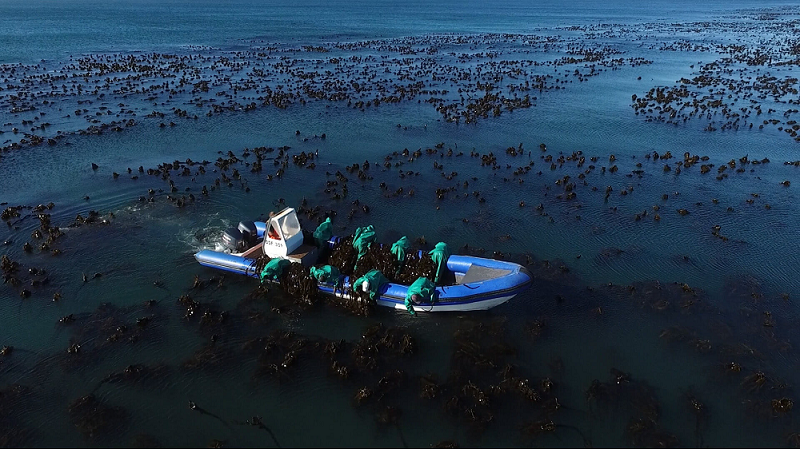Jul 26, 2023Beating the heat: kelp-based fertilizer helps stem yield losses
The record-breaking heat this summer has focused attention on measures to stay cool and safe, especially for those who work outside in agriculture and other industries.
Heat can also adversely affect the crops those workers are harvesting, which must release water through transpiration to lessen the effects of heat stress.


“When the plant starts going into that process, it’s going to use water and have less water available to it,” said Drake Salwasser, Central Valley (California) sales agronomist for Afrikelp-USA, the Fresno, California-based U.S. subsidiary of South Africa-based Afrikelp.
Afrikelp manufactures and markets fertilizers derived from Ecklonia maxima, the South African brown kelp found off Africa’s southern Atlantic coast.
Also known as sea bamboo, the kelp can help specialty and other crops mitigate the effect of heat stress. If a plant’s heat stress isn’t addressed, growth will be affected.
“With the plant’s physiology, there are going to be processes that are disruptive,” Salwasser said. “The plant can shut down for a period of time. If the surface of the plants reaches above 95(°F), or close to 100°, the plant can shut down.”


Afrikelp has internal and external field trial research that shows extract from the South African kelp is an effective fertilizer across a wide selection of nut, fruit and vegetable crops, and research is branching out to row crops, with corn and soybeans.
The company also makes and markets an organic crop approved formulation, Afrikelp O-LGI.
The source
The kelp is endemic to South Africa, just off the Western Cape. Its harvest is monitored by the federal government and third parties, which track activity at the kelp beds with GPS, including monitors on every boat used for harvesting. South African universities also monitor the kelp beds to ensure they are not over-harvested.
With the right conditions, kelp varieties can grow up to 18 inches a day. Afrikelp’s harvest rotation allows for several months for the fronds at the top of the canopy to grow back before harvesting that area again.


“We have to be extraordinarily careful not to over-harvest and to monitor the areas in which the kelp grows along the coastline,” Salwasser said.
Afrikelp’s original use for the harvested kelp was for abalone and other shellfish feed and to produce agar for laboratory use as a growing medium, but it now focuses on agricultural use. The kelp fronds are cleaned and then micronized at the company’s production facility in the coastal town of Gansbaai. The extract is transported to Afrikelp’s Cape Town headquarters for blending and standardization of the final products.
During the manufacturing process, the fronds and extract are kept in a cold environment to keep the compounds in the kelp viable, Salwasser said.
Application and crops
Afrikelp fertilizers can be applied in different ways:
- Dip — Roots of seedlings can be dipped at planting to reduce stress symptoms associated with transplant shock.
- Drench — Afrikelp LG-1 can be applied directly to the soil at different planting schedules.
- Foliar spray — Afrikelp LG-1 can be applied as a foliar spray.
- Aerial/chemigation — Irrigation systems can also distribute the seaweed extract.
Crops the Afrikelp formulations can be used on in the U.S. include nuts (almonds, walnuts and pistachios), citrus, wine grapes and table grapes, cherries, blueberries, potatoes, peppers and tomatoes. Links include trial information.
This summer, research includes trials on soybean and corn with Michigan State University’s North Central Research Station in St. Johns, and in Des Moines, Iowa.
“We are continuously working to expand the reach of our material,” Salwasser said, although the Fresno-based Afrikelp-USA has focused on nut and fruit crops in California’s Central Valley.
“We took the step and branched out into those opportunities (soybean and corn), but every single year we’re doing trials in citrus, table grapes, pistachios. We have a lot of trial data.”
Heat stress
Interest in seaweed extracts as a fertilizer is growing, as droughts and record-breaking heat spells point to climate change. A focus on sustainability and reduced use of synthetic materials is also fueling interest.


When applied as a foliar spray during the cool part of the day before heat stress happens, Afrikelp can help manage the heat stress, according to the company.
For every hour a plant is exposed to heat stress, it takes two hours to recover, Salwasser said.
“That’s a really important piece of the puzzle, because if you’re experiencing extreme heat during the time of the season when you’re trying to size the crop, whatever important time frame you’re going to be in, it’s going to be detrimental to the yield when that happens,” he said.
Research has also shown seaweed extracts can help improve growth, vigor and productivity.
— Chris Koger, managing editor















